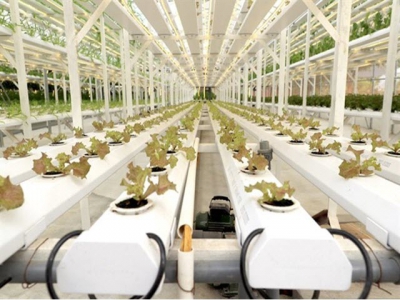Hanoi aims to develop smart agriculture

The capital city has implemented many high-tech agricultural production models in order to move towards smart agriculture.
However, the city will have to pay more attention to promoting the application of science and technology as well as training high-quality labour resources.
Developing smart agriculture is a trend for agricultural production around the world and in Vietnam, including Hanoi, said Deputy Director of the municipal Department of Agriculture and Rural Development Ta Van Tuong.
The city currently counts 164 hi-tech agricultural production models, including 105 involved in crop production, 39 in livestock, 15 in fisheries and one model combining cultivation and husbandry.
The value of hi-tech agricultural products currently accounts for about 35 percent of the total value of agricultural production in the city.
Modern technology and equipment in the management of agricultural production to help reduce labour, increase quality and output of agricultural products is considered the most important factor, the official said, affirming that high-tech agricultural models are increasingly blooming and bringing efficiency to the city's agriculture.
The city's agriculture sector has promoted the application of scientific advances to agricultural production, including technology of greenhouses with an automated watering system (in the field of planting), cooling system to help stabilise temperature and humidity, automatic feeding lines, artificial insemination (breeding), using biological products and automatic oxygen generator (aqua-culture).
Tran Duy Quy, Chairman of the Vietnam Association of Rural Development Sciences, said that developing smart agriculture and applying advanced science and technology to production was very important.
With a densely populated city like Hanoi, the application of science and technology in production will help transform traditional agriculture to smart agriculture, thereby increasing incomes for farmers, he said, adding that it helps solve problems of land shortage, improve the living environment, and reduce pollution.
Dao The Anh, Deputy Director of the Vietnam Academy of Agricultural Sciences, said that the city needed to promote training human resources, especially high-quality human resources.
Related news
 What do pigs say when humans are away?
What do pigs say when humans are away? Why is it important to know what animals do when humans are not around? This article explores the tremendous benefits of putting up the right cameras
 One farm tried to make sustainable food affordable - Here’s what happened
One farm tried to make sustainable food affordable - Here’s what happened Become an example of a Black and Indigenous farmer who could make it work among the overwhelmingly white crowd of U.S. farm owners.
 Vast untapped potential for fruit, vegetable exports to EU
Vast untapped potential for fruit, vegetable exports to EU The EU is a promising market for Vietnam with its annual fruit and vegetable imports of EUR35 billion, accounting for 45 percent of global trade